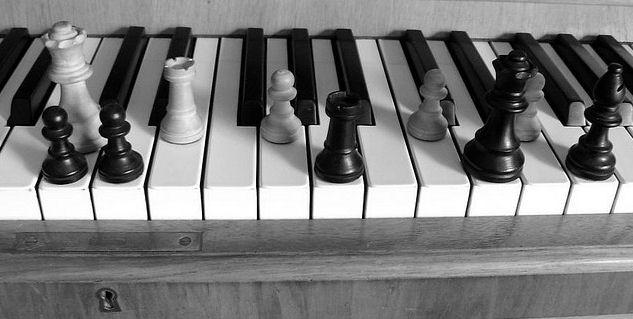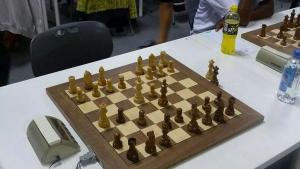
Chess and Music
Hello, and welcome to my first article for chess.com. Given that I'm not a professional chess player (far from it) and that my actual occupation is in music it was easy to decide upon the subject of music and chess, especially as there's been so many notable overlaps between the two fields. In fact, the very first chess "great", François-André Danican Philidor, was rather better known in his day as an opera composer. Here’s a sample of his music:
Perhaps it’s due to the specialization of modern times that the idea of someone like Carlsen or Nakamura writing, say, a broadway musical (let alone an opera still performed 250 years after its premiere) strikes us as absurd. On the other hand, Philidor wasn’t a fashion model and he definitely never managed a rating of 3600 at bullet chess, so, er, take THAT, 18th century.
Anyhow, moving on, the next few chess players are admittedly much better known for their music: Robert Schumann and Johannes Brahms. If you don’t know about these two guys, probably the best way to currently describe them is that they are more or less the exact opposite of Justin Beiber in every possible way.
Schumann’s interest in chess is evident from his diary (an interesting read in any event); here’s a german website with a sampling of some of the puzzles he happened to jot down, perhaps in order to create the world’s first tactics trainer application. Brahms's connection to chess is rather more tenuous, though apparently some felt he and Steinitz were “doppelgangers”, due to being of similar age, appearance, personality, nationality, and preeminence in their respective fields. Furthermore, both men were no strangers to controversy and both could be said to have undergone a similar stylistic evolution from brilliance to deep profundity. Or, er, something like that. Anyhow, Brahms’s actual chess relevance probably rests entirely on a characteristically dry/ironic reply he once gave to someone who asked what he had learned from Schumann: “Nichts als schachspielen” (“Nothing but chess”).


Moving out of the 19th century, we now come to another great composer with much stronger chess credentials than those of our previous two: Sergei Prokofiev. Not only was Sergei a first class player, but one of the very few who can claim to have beaten Jose Capablanca:
Prokofiev also happened to be in town during the great St. Petersburg tournament of 1914 (which we really should now be holding a centennial celebration of), and his diary provides several fascinating first-hand descriptions of the players:
‘At eight o’clock I went to the opening of the Chess Championship and found myself translated immediately into an enchanted realm, a realm alive with the most unbelievable activity in all three rooms of the Chess Club itself and three more rooms made available by the Assembly Committee. This tournament is a top-level affair, everyone in tailcoats, and here were the masters themselves each surrounded by a crowd of admirers.
Lasker, a little greyer since the 1909 tournament, with his distinctive face, his slight stature and an air of knowing his own worth; Tarrasch – a typically upright German with Kaiser Wilhelm moustaches and an arrogant expression; our own Rubinstein – a coarse, unintelligent-looking face, a touch of the shopkeeper about him, but modest and talented compared to Tarrasch, erratic but dangerous to any opponent; Bernstein, a prosperous-looking man with a handsome, impudent face, shaven head and a colossal nose, dazzling teeth and relentlessly brilliant eyes. Our own gifted Alekhine, with his lawyer’s coat and his slightly pinched, slightly disagreeable lawyer’s features, self-confident as ever but nevertheless a little subdued by the magnificence of the company. Marshall, the American, a typical Yankee, with a touch of Sherlock Holmes about him, ferociously passionate in play but ludicrously taciturn in private. Yanovsky [sic] from Paris, a deserter in his youth from military service and now exceptionally allowed special dispensation to return unmolested for the championship, wearing an exquisitely elegant light grey suit, formerly a famously good-looking breaker of hearts but now in his fifth decade showing his age and wearing gold-rimmed spectacles. The combative vegetarian Nimzowitsch, a typical German student and trouble-maker. Finally two older men, destined to be the victims of all, the portly Gunsberg and, wearing on his face a permanently injured expression, Blackburne, still, despite his 72 years, capable of producing original combinations and elegant developments in his conduct of a match. The crowd’s favourite, Capablanca, young, elegant, gay and with a constant smile on his handsome face, circulated through the hall laughing and chatting with the easy grace of one who already knows himself to be the victor.
Thus it was that I found myself in this irresistibly seductive kingdom, absorbed from the first moment by the forthcoming contest. The speeches began, laying stress on the unprecedented importance of the event with its exceptional galaxy of participants. Journalists from England, Germany, Moscow, Kiev, Vienna, chess masters from Germany, photographers, all added to the splendour of the occasion. The first round begins tomorrow!!!’
For more along these lines, I highly recommend Edward Winter’s typically interesting and informative article from which I’ve already snipped a chunk or two off of.
Moving even further into the 20th century we come to arguably the most remarkable duo of musician/chess players, Vasily Smyslov and Mark Taimanov. I’m not sure which of these two is the more remarkable, actually: Smyslov was World Champion and a semi-professional baritone who once auditioned at the Bolshoi, but International Grandmaster (and many-time World Champion Candidate) Taimanov was one of the greatest pianists of his generation; the duo he formed with his wife Lyubov Bruk was, as Kanye might say, one of the best of all time. In any case, here's a video of each, though sadly I cannot find one of them performing together, as they often did after tournaments.
Coming to modern times, we find that in the post-Fischer era (symbolically enough, given that Fischer all but ended Taimanov’s chess career) there are fewer and fewer examples of professional chess players able to conduct a second career in something as time-consuming as music. That said, they still do exist. For instance, there’s Calvin Blocker, the enigmatic International Master, pianist, and subject of a fascinating local media article. Also noteworthy (no pun intended) was the late/great Igor Ivanov whom I had the pleasure to watch at many a tournament in Northern California. Finally, we have the remarkable and brilliant Israeli Emil Sutovsky who has been ranked as high as 17th in the world and, as can be heard below, is a fine basso profundo:
I hope you enjoyed this brief survey of some of the better known “combinatons” of chess and music; I’m always interested in hearing of other, perhaps even more current, examples. If you have any, please mention them below in the comments!
***






